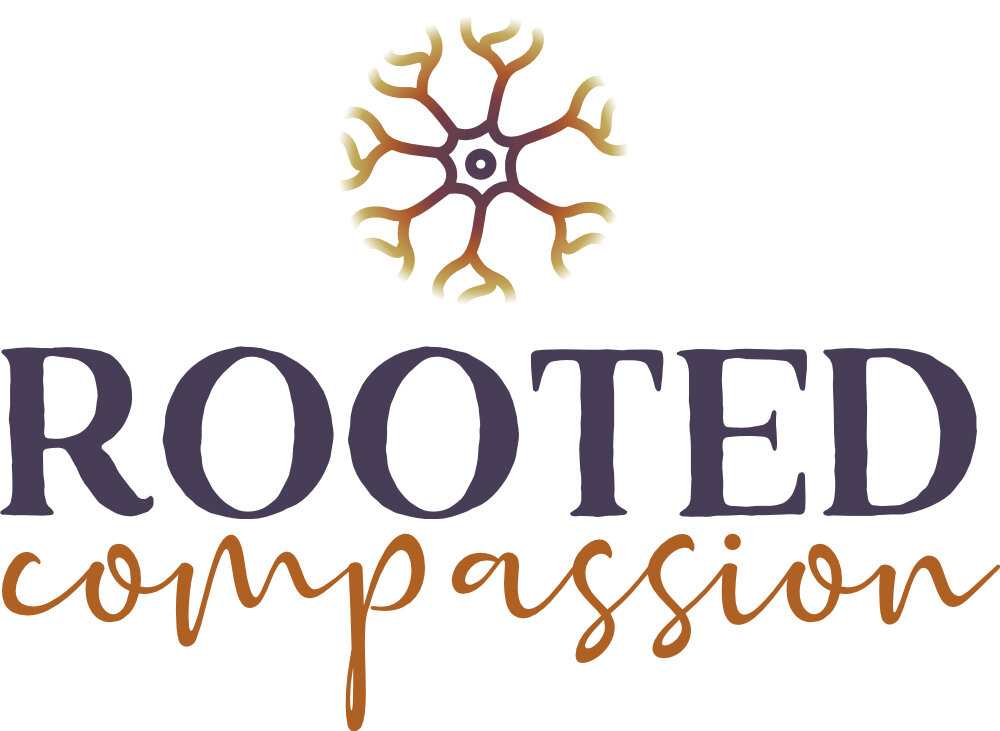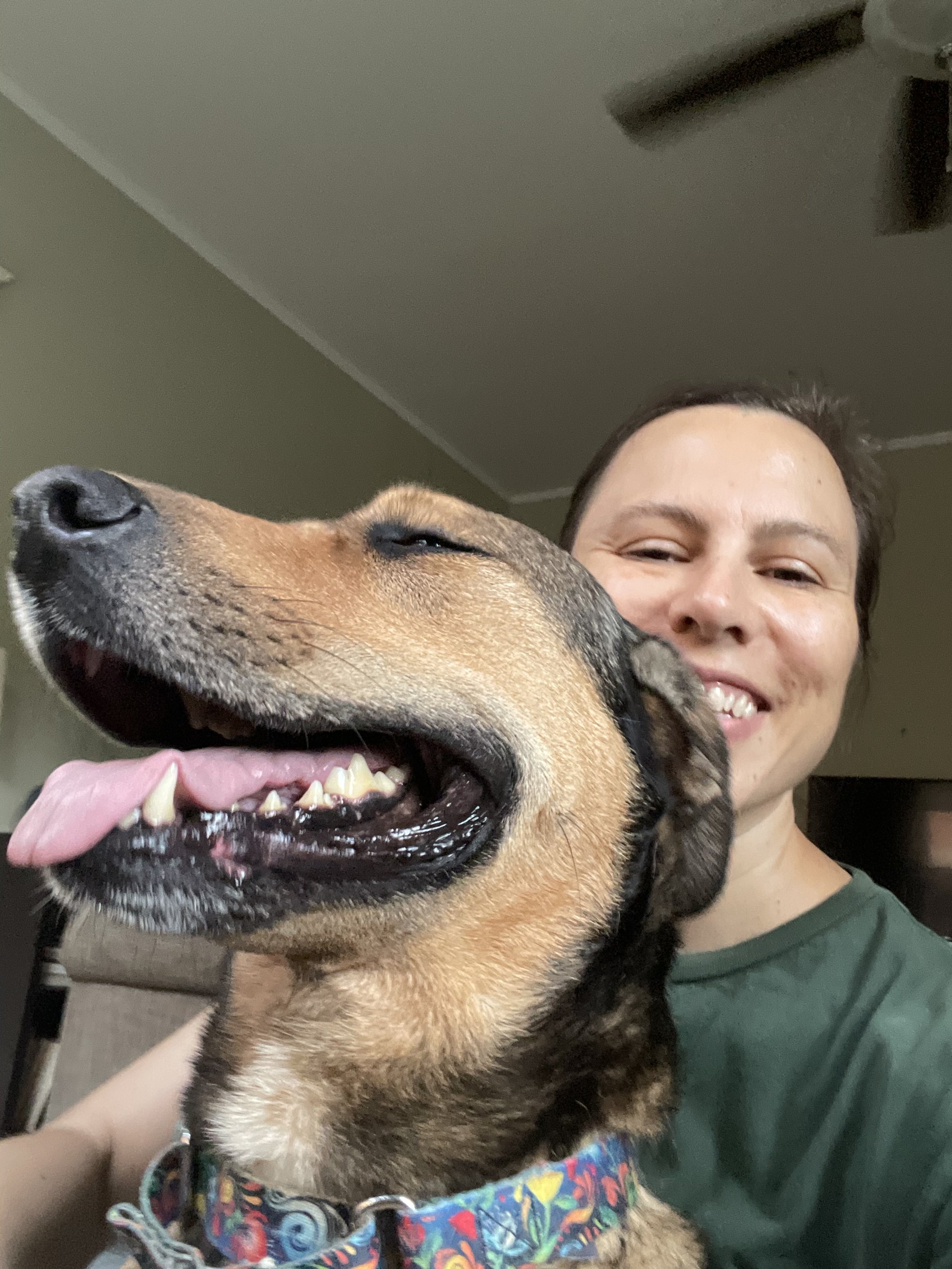What My Dog is Teaching Me About Trauma
In the midst of the pandemic, my partner and I did what so many other people did–we looked into adopting a dog. The minute Sky, a gregarious brown eyed beauty, came into the “meet and greet” room, I knew we were in trouble. She was a beautiful puzzle of wiggly sweetness with humans and tenaciously aggressive when encountering other dogs and animals. Little did I know that she would be my guide and mentor through training with Finding Hope in Trauma Responsive Care. Sky helped me to embody the critical mindset change I would need to understand trauma.
Instead of asking “what happened to you?,” being willing to engage in thinking about “what did you do to survive?”
When I flipped that question, I went from being frustrated with the constant tugging on the leash and reactivity to other dogs, cats and the dreaded squirrel to being curious about how her behaviors might have served her in the past and even in the present moment. I began to see the fear underneath the aggressive lunging at other dogs and her actions as a protective mechanism.
Through working with a wise and skillful dog trainer, we began to learn how to create more felt safety for our lovable four legged friend. What was so amazing about this process was to witness and experience the transformation in both Sky and myself as we began to forge a relationship of trust. And while dogs communicate quite differently than humans, there are few general guiding principles of working with trauma, in ourselves and in our interactions with others, that can be illustrated in our doggie and human interactions.
The first thing the dog trainer taught us was that “no learning happens in the red zone” meaning that when Sky was baring her teeth in an aggressive fit of barking at another dog, no learning could take place. This is similar in humans.
When we experience stress or traumatic activation, we lose our ability to connect to any rational thoughts.
Dan Siegel developed a simplified explanation of the brain modeled on the human hand to describe how when our fear center (the amygdala) senses danger, it can take over and “flip your lid”, meaning the prefrontal cortex, where we access our logical ability to analyze actions and consequences, goes offline. So when a human or dog encounters what their nervous system experiences as a threatening situation, all logic goes out the window (see Amy’s blog on Big T vs. Little T trauma - here). So often, other people’s or creature's responses to fear do not appear logical to the outside observer.
Suggesting they should just “calm down” doesn’t help, because rational thought is not something that can be accessed.
Now you might be asking yourself, so what do you do when you feel yourself going offline or witness a human or four legged creature going into the “red zone”? Our dog trainer’s response was to get Sky out of the stressful situation as soon as possible and not to engage in any punishment or consequences.
One of the greatest gifts we can give to ourselves and to others is the space to recuperate without retaliation. Sky has taught me to look for safety when heightened situations escalate into the red zone in all areas of my life.
When intense emotions or conflict arise, I know the power of making space and waiting until I can connect to my breath and the feeling of my feet on the ground before engaging in any action.
This is important in my interactions with others but also as I experience the escalation of my own emotions. Sky has helped me to practice finding that safety by giving myself space and time to reconnect to my thinking/feeling/breathing self.
Our walks sometimes would take unusual routes as we avoided provocations like other dogs, the garbage truck and cats. Sky began to learn that I was attuned to her fear and would help to keep her safe. And through practice, I learned how to time and time again (sometimes multiple times on a walk around the block) return to my calm and regulated state.
It’s been over a year now and I am often still amazed when Sky can see a dog on the other side of the street with no reaction or redirect easily when I notice her moving into the “yellow zone.” How did we get there? Practice, practice, practice. Our trainer encouraged us to focus on the incremental improvements, and to see each encounter as an opportunity to learn.
While I was learning about trauma in my training, Sky gave me the opportunity to apply what I was learning into my daily life, and that is where the real healing and growth can happen.
It can be hard to work through our own stress and trauma, and it can also be equally hard to work with the stress and trauma of others in our lives. This journey of our little family of three has been guided by wonderful dog trainers who helped us to develop a strong and trusting relationship with Sky.
In the trauma treatment offered at Rooted Compassion, we understand this concept and work to help you restore your autonomic nervous system to health and vitality. To schedule with one of our highly trained trauma therapists, click here: https://www.rootedcompassion.com/contact.
Photos:
Photo #1: Sky
Photo #2: Sky and Kimber
Kimber Andrews (she/her/hers) is currently a student in the University of Cincinnati’s Mental Health Counseling Program and is excited to be an intern at Rooted Compassion. As a counselor in training, Kimber is working towards a Trauma Responsive Care certification and brings experiences from her work as an educator, yoga and mindfulness instructor, and performing artist to her work with clients.
The Rooted Compassion team is made up of a group of counselors who have a variety of specialties in order to best serve our clients. We recognize that every person has his/her own personal and unique life experiences and that one modality will not work for every client. Listed below is a summary of our counselors’ specialties at Rooted Compassion:
Emotional Freedom Techniques
Grief Counseling
Somatic Focused Counseling
EMDR
Cognitive Behavioral Therapy
Dialectical Behavior Therapy
Mindfulness-Based Practices
Trauma Responsive Care Techniques
Acceptance and Commitment Therapy
Drama Therapy/Expressive Arts
If you are interested in learning more about what Rooted Compassion is all about, please contact us today, look through our website, or find us on Instagram and Facebook.
Rooted Compassion Counseling is Ohio’s leading practice for trauma therapy through the lens of the nervous system. Our focus is to walk alongside clients as they heal from depression, anxiety, trauma, grief and/or loss. If you or someone you know are seeking to explore and build an inner sense of calm and safety, please contact us today. We would love to help you to find a counselor and counseling techniques that will guide you on your mental health journey to healing.




